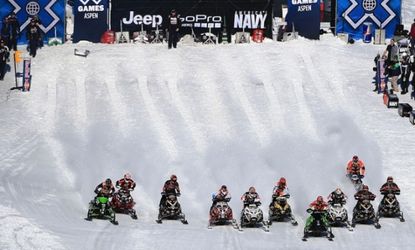Why parents should let their kids play dangerous sports
Parental fear threatens to deprive many young people of the lessons of organized athletics — lessons they cannot learn anywhere else

"Are you not entertained? Are you NOT entertained? Is this not why you are are here?"
So shouts Russell Crowe's character Maximus in the most powerful scene of Ridley Scott's award-winning film Gladiator, after Maximus vanquishes his opponent with such aggressiveness that it leaves the crowd in stunned silence. Maximus' point — that the crowd was there for the violence and the danger — remains as true as ever. But today, our collective fascination with bigger, faster, stronger, higher, more aggressive, more dangerous, and more powerful athletic enterprises has very real costs for the participants who deliver the thrills.
The most recent and extreme example of the dangers of our sporting culture comes from the world of extreme snowmobiling. On Thursday, a 25-year-old Texan called Caleb Moore died from injuries sustained when his snowmobile came crashing down on his head after one of his tricks went horribly wrong during his run in the Snowmobile FreeStyle competition in the Winter X Games in Aspen, Colo. Moore suffered his injuries after he attempted to do a backflip on his snowmobile. He came up short and the skis on the front of his snowmobile caught the lip of the landing area, sending Moore flying over the handlebars. When Moore hit the snow, his 450-pound snowmobile came crashing down on his head, causing injuries that ultimately led to his death. The death was the first to occur in the X Games' 18-year history, which is something of a miracle given the activities involved. The injury that led to Moore's death was broadcast live on ESPN.
Subscribe to The Week
Escape your echo chamber. Get the facts behind the news, plus analysis from multiple perspectives.

Sign up for The Week's Free Newsletters
From our morning news briefing to a weekly Good News Newsletter, get the best of The Week delivered directly to your inbox.
From our morning news briefing to a weekly Good News Newsletter, get the best of The Week delivered directly to your inbox.
This is only the latest in a long list of recent episodes illustrating the undeniable fact that the sports we love are killing the athletes we worship for playing them. For example, San Diego Chargers legend Junior Seau shot himself in the chest — allowing his brain to be preserved and studied. Researchers concluded that Seau suffered from chronic traumatic encephalopathy (CTE), a type of chronic brain damage that is increasingly becoming a side effect of being an NFL football player.
The list of dangerous sports goes on and on — hockey, soccer, rugby, skiing, snowboarding, baseball. And these realizations have given rise to a debate at dinner tables and in living rooms across the United States: Should children play sports, like football, that are demonstrably dangerous, and that have long-lasting health consequences?
Indeed, no less a figure than Barack Obama recently told The New Republic, "If I had a son, I'd have to think long and hard before I let him play football."
But children should absolutely be allowed to play such sports. Parental fear threatens to deprive many young people of the lessons of organized athletics — lessons they cannot learn anywhere else.
I respect the president's comments, and I think they reflect the views of many parents in the United States. But I also think it is a shame that people would not allow their children to play football or ski or play hockey because of the risk of concussions. Sports, even violent and dangerous sports, continue to represent something noble about the human spirit.
Many people watch the trick that Caleb Moore died trying and think, "what kind of lunatic would even think to do such a thing?" or "what kind of parent would allow their child to do such an obviously stupid thing?" But we nevertheless watch because the tricks are so audacious, so dangerous, so… crazy. Caleb Moore's death is a tragedy, but it should also be recognized that Moore died doing what all great humans do in one way or another: Pushing the limits of the possible. He literally died trying to fly.
Physical safety matters. But our collective obsession with protecting our children from harm threatens to turn out a generation of children ill-equipped spiritually or emotionally to deal with the brave new world order in which only the tough and the persistent will thrive. Children in modern America are growing up in a country paralyzed by complacency and fear. Our political leaders are hardly great, and our economic power is sputtering. Life is not going to be easy, or safe, even for the competent. We would do well to remember that spiritual development is every bit as important as physical safety.
Between the lines, our children learn the importance of teamwork, sportsmanship, toughness, and competitiveness. Between the lines, our children learn to strive, to succeed, and most importantly, how to fail. When the time comes, let your kid play football, or hockey... or whatever, and let him decide for himself. He may break his leg or suffer a concussion, but he will be far better off for it over the course of his life than if he stays inside and plays video games.
Jeb Golinkin is a 3L at the University of Texas School of Law and writes about U.S. politics and policy for TheWeek.com. From 2008 to 2011, he served as an editor and reporter for Frum Forum/New Majority. Follow him on Twitter (@JGolinkin) and email him at jgolinkin@gmail.com.
Sign up for Today's Best Articles in your inbox
A free daily email with the biggest news stories of the day – and the best features from TheWeek.com
Jeb Golinkin is an attorney from Houston, Texas. You can follow him on twitter @jgolinkin.
-
 Today's political cartoons - December 21, 2024
Today's political cartoons - December 21, 2024Cartoons Saturday's cartoons - losing it, pedal to the metal, and more
By The Week US Published
-
 Three fun, festive activities to make the magic happen this Christmas Day
Three fun, festive activities to make the magic happen this Christmas DayInspire your children to help set the table, stage a pantomime and write thank-you letters this Christmas!
By The Week Junior Published
-
 The best books of 2024 to give this Christmas
The best books of 2024 to give this ChristmasThe Week Recommends From Percival Everett to Rachel Clarke these are the critics' favourite books from 2024
By The Week UK Published